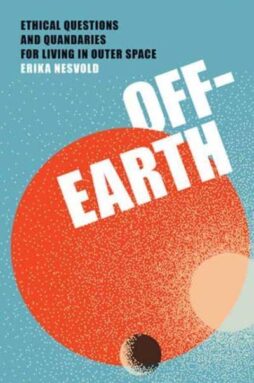Off-Earth
Erika Nesvold
MIT Press, $27.95
Astrophysicist Erika Nesvold once asked an executive of a company aiming to mine the moon how he planned to address risks that mining equipment might carry microbes from Earth and contaminate the moon (SN: 1/10/18). His response: “We’ll worry about that later.”
That’s a reckless mind-set when it comes to preparing for people to live and work in space, Nesvold argues in her new book, Off-Earth. It means making decisions with your eyes closed. History is full of cautionary tales of mutinies, exploitation, and humanitarian and ecological disasters that would be all too easy to reproduce in space.
“Space settlement advocates often advertise space as a blank slate where we can build utopian societies free from the crowded territory and bloodied history of our terrestrial home,” Nesvold writes. “But adopting a ‘worry about it later’ attitude toward human rights and ethics strikes me as a path to repeating the tragedies of that history through ignorance.”
Nesvold is a developer for the education software/video game Universe Sandbox. In the last several years, she has shifted her focus to how to build a fair and just future in space, cofounding the JustSpace Alliance, a nonprofit working to do just that. Off-Earth is an extension of her 2017 podcast, Making New Worlds, which asked ethical questions about space settlement. The book takes some of the same questions and expands on them. Each chapter title is a question: “Why are we going?” “Who gets to go?” “Who’s in charge?” “What if I get sick?” “Which way is Mecca?”
Most chapters start with three vignettes, usually from different time periods. A chapter outlining debates over whether to settle space at all starts by asking the reader to imagine being in the 1600s and deciding to uproot your family and head to the New World. A chapter on how land usage and ownership rights might work in space imagines a person recently freed from slavery in the U.S. South in 1865 and worrying that the new president will take back the land they finally own. A chapter on the ethical questions that will arise when people get sick in space conjures a hospital worker in 2020 making gut-wrenching triage decisions during the COVID-19 pandemic. The third vignette is usually set in the year 2100, on a space settlement.
Then Nesvold examines how various ethical scenarios related to the chapter’s theme might play out in space. She quotes experts in fields that don’t often come up in space science: ethics, philosophy, Indigenous history, law.
This approach is a departure from many books about the future of life on the final frontier, forcing readers to confront hard realities and possible points of friction. A lot of arguments for moving humankind off Earth assume space is a land of infinite resources. But at least at first, settlers will have much more limited resources than they did on Earth. And situations where humans are isolated with limited resources, like on ships or in colonial settlements, have often been recipes for disaster.
Subscribe to Science News
Get great science journalism, from the most trusted source, delivered to your doorstep.
So how will space settlers share what little they have? How will they decide who lives and dies, and what quality of life and death they’ll have? Will living in the harsh conditions of an early space settlement nurture innovation and creative progress, or encourage humankind’s worst tendencies toward exploitation and tyranny?
Most of these questions don’t have clear answers. That’s partly because ethical questions rarely do. The book “has undoubtedly revealed much about my own political opinions and priorities, not to mention the influence of my personal background and the culture in which I was raised,” Nesvold writes. “In the same way, your position on these issues is likely deeply connected with your own values and beliefs.”
Finding answers is also challenging because it requires anticipating what our descendants, who will live in the space communities we are already creating, will want, need and believe. To have the best chance of avoiding disaster, the time to consider these questions is now, not later, even though space settlement may be decades or centuries away, Nesvold argues.
Off-Earth should be required reading for anyone who dreams about living in space. Space is not a blank slate, but imagining a better world there can help us build one — and can help make our earthbound civilizations better too.
Buy Off-Earth from Bookshop.org. Science News is a Bookshop.org affiliate and will earn a commission on purchases made from links in this article.



